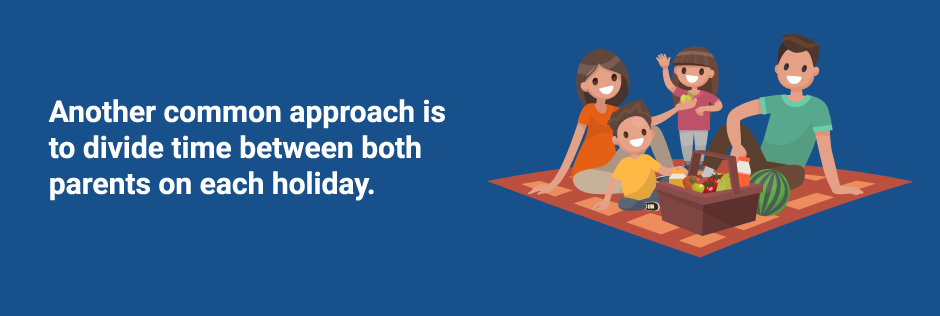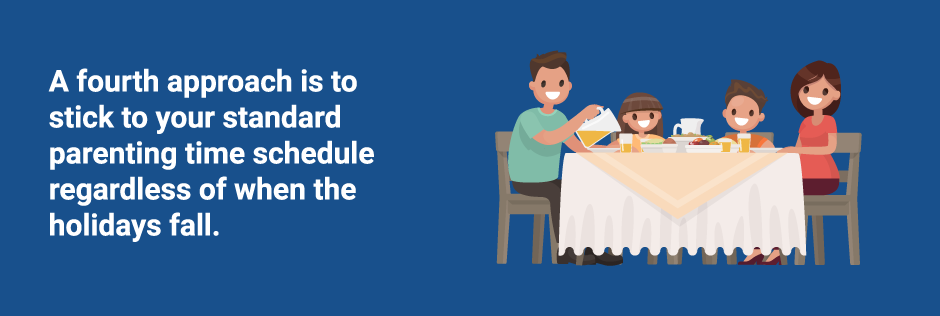As a parent preparing to go through a divorce, one of your top priorities is likely to be establishing a custody and visitation schedule that meets your needs while protecting the best interests of your children. Along with addressing nights, weekends, and transportation for school and extracurricular activities, you will also need to figure out a plan for holiday parenting time for each of the various holidays throughout the year.

For obvious reasons, holiday scheduling presents a potential for conflict during the divorce process. Understandably, both parents will want to spend the holidays with their children as frequently as possible; but, absent a successful co-parenting arrangement, a mutual compromise will be required. From informal negotiations to collaborative divorce and mediation, there are a number of options for keeping divorce-related disputes out of court, and finding a way to come to terms will typically be in the best interests of everyone involved.
5 Ways to Schedule Holiday Parenting Time

With these considerations in mind, here are five options for scheduling holiday parenting time during your divorce. Of course, this list is not exhaustive, and divorcing parents who are willing to work together will be able to explore other alternatives that may work better for their particular circumstances:

- Assigning Individual Holidays
One option is to assign specific holidays to each parent. For example, one parent would spend every Memorial Day with their children, and the other parent would get every Labor Day. While this can work in some circumstances (and can help for avoiding confusion over “whose holiday” it is), some parents will find this approach undesirable since it means never getting to spend certain holidays with their children.

- Certain Holidays on Even/Odd Years
A common approach is to alternate holidays on an annual basis. The easiest way to think about this is to say that one parent gets certain holidays during even-numbered years and the other gets those holidays on odd-numbered years. This ensures that both parents will have the opportunity to spend each holiday with their children, but it means going two years between each opportunity to celebrate each individual holiday.

- Morning vs. Afternoon/Evening
Another common approach is to divide time between both parents on each holiday. Frequently, this involves the non-custodial parent spending the morning with their children, and then the children returning to their custodial parent’s home for the rest of the day. But, there are other options as well (such as one parent spending the eve of the holiday with their children); and, if this is the approach you want to take, you will need to think about which option works best for you.

- Standard Parenting Time
A fourth approach is to stick to your standard parenting time schedule regardless of when the holidays fall. While this makes scheduling easy, it also means that one parent may end up getting to spend more holidays with their children than the other.

- Co-Parenting During the Holidays
Finally, under the right circumstances, some divorcing parents may want to consider co-parenting during the holidays. With co-parenting, all members of the family come together for the children’s benefit. Co-parenting isn’t right for everyone, but it is becoming more popular, and it is certainly an option to consider if you think it might be a viable solution.
As we previously discussed, once your marriage is over, it will be important to make sure you stick to the terms you agreed to during your divorce. Your parenting plan will become legally-binding upon finalization of your divorce, and violating your plan can have serious negative consequences.
Schedule a Confidential Consultation with New Jersey Divorce Lawyer Carrie S. Schultz

If you would like more information about how to structure a successful parenting plan, please contact our offices to schedule an initial case evaluation. To speak with New Jersey Divorce Lawyer Carrie S. Schultz in confidence, call (201) 654-4263 or request an appointment online today.

